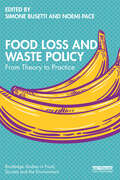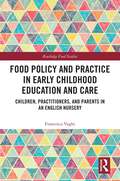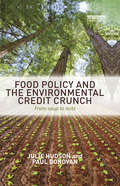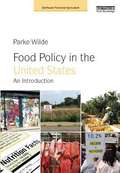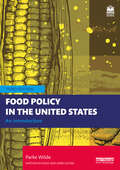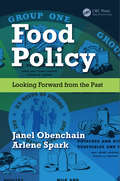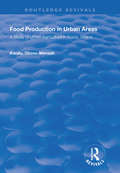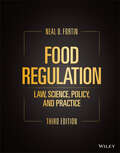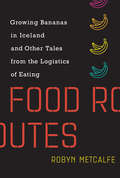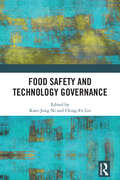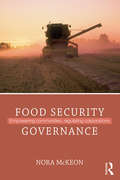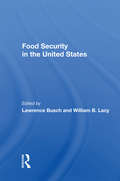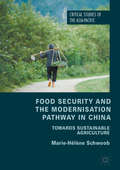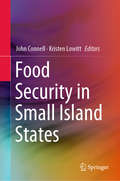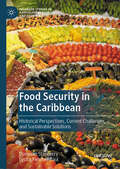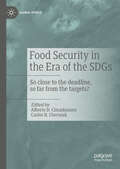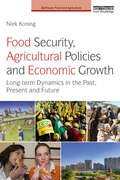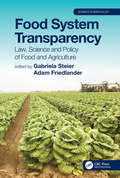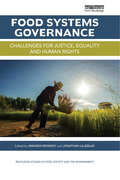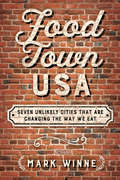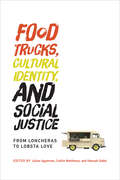- Table View
- List View
Food Loss and Waste Policy: From Theory to Practice (Routledge Studies in Food, Society and the Environment)
by Simone Busetti Noemi PaceThis book examines policy responses to food waste and loss, an issue of significant, global concern, with one-third of food produced for human consumption lost or wasted. Investigating food waste and loss under an interdisciplinary lens, the contributors employ a variety of methodological approaches, including quantitative and qualitative techniques, drawing on in-depth case studies and action research. The volume is organised into four parts: Understanding Food Loss and Waste, International Programmes, National Policies and Local Initiatives. The first part introduces the reader to the concept of food loss and waste, how it can be measured, its causes and consequences, and how it can be reduced. The second part is dedicated to international and cross-country case studies, with six chapters reviewing national policies implemented in France, Italy, Romania, Japan, China and the United States. In Part Four, three chapters are dedicated to local food recovery and redistribution initiatives. By focusing on different territories and different levels of governance, the book provides a detailed evaluation of food loss and waste policies, the barriers and opportunities of implementing the policies, as well as the impact they are actually having. The chapters are both descriptive and evaluative and draw out lessons for designing, implementing and reforming programmes. This book will be of great interest to students and scholars working on food waste, food policy, sustainable food systems, agricultural production and supply chains and public policy, as well as policymakers involved with developing and implementing programmes and policies to regulate and reduce food waste and loss.
Food Policy and Practice in Early Childhood Education and Care: Children, Practitioners, and Parents in an English Nursery (Routledge Food Studies)
by Francesca VaghiThis book is about food and feeding in early childhood education and care, offering an exploration of the intersection of children’s food, education, family intervention, and public health policies. The notion of ‘good’ food for children is often communicated as a matter of common sense by policymakers and public health authorities; yet the social, material, and practical aspects of feeding children are far from straightforward. Drawing on a detailed ethnographic study conducted in a London nursery and children’s centre, this book provides a close examination of the practices of childcare practitioners, children, and parents, asking how the universalism of policy and bureaucracy fits with the particularism of feeding and eating in the early years. Looking at the unintended consequences that emerged in the field, such as contradictory public health messaging and arbitrary policy interventions, the book reveals the harmful assumptions about disadvantaged groups that are perpetuated in policy discourse, and challenges the constructs of individual choice and responsibility as main determinants of health. Children’s food practices at the nursery are examined to explore the notion that, whilst for adults it is what children eat that often matters most, to children it is how they eat that is more important. This book contributes to a growing body of literature evidencing how children’s food is a contested domain, in which power relations are continuously negotiated. This raises questions not only on how children can be included in policy beyond a tokenistic involvement but also on what children’s well-being might mean beyond the biomedical sphere. The book will particularly appeal to students and scholars in food and health, food policy, childhood studies, and medical anthropology. Policymakers and non-governmental bodies working in the domains of children’s food and early years policies will also find this book of interest.
Food Policy and the Environmental Credit Crunch: From Soup to Nuts
by Paul Donovan Julie HudsonThe changing economic environment for the consumer that is emerging from the wreckage of the financial credit crunch plays directly into the importance of food spending. This is certainly true from the perspective of food prices in the short run, but also from the perspective of sustainability and reducing the impact of the environmental credit crunch. The economic changes we experience now have a bearing on our ability to manage the environmental credit crunch that looms. Food Policy and the Environmental Credit Crunch: From Soup to Nuts elaborates on the issues addressed in the authors’ first book, From Red to Green?,and asks whether the financial credit crunch could ameliorate or exacerbate the emergent environmental credit crunch. The conclusion drawn here is that a significant and positive difference could be made by changing some of the ways in which we procure, prepare, and consume our food. Written by an economist and an investment professional, this book addresses the economic and environmental implications of how we treat food. The book examines each aspect of the ‘food chain’, from agriculture, to production and processing, retail, preparation, consumption and waste.
Food Policy in the United Kingdom: An Introduction (Earthscan Food and Agriculture)
by Rebecca Wells Martin Caraher Sinéad FureyThis book provides an introduction to food policy in the United Kingdom, examining policy development, implementation, influences and current issues. The book begins by providing a wide-ranging introduction to food policy in the UK, situating it within wider global debates and establishing key drivers, such as issues related to global citizenship, trade and finance. The use of food control as a policy lever is also discussed and contrasted with alternative approaches based on behaviour change. The book presents an overview of the history of UK food policy, from which there is much to be learned, before moving onto current challenges posed by political instability, both at home and abroad, global pandemics and cost of living crises. Foremost is the need to manage public health, including both malnutrition and obesity, while promoting sustainable and healthy diets, as well as the broader issues around addressing food security and food poverty. The book also examines public sector food initiatives, such as school food and early childhood provisions, and food regulation. As a part of food regulation, chapters examine food scares and food fraud, from chalk in flour to "horsegate". The role of media, marketing and advertising is also considered within a policy perspective. Taking a wider lens, the book also discusses the impact of global food trade and the financialisation of food on food policy in the UK and vice versa. The book is supported by instructor eResources on the Routledge website designed to support student learning as well as provide regular updates on UK food policy developments. The eResources include student activities, group exercises and links to further reading and additional resources. This book serves as a key introduction to UK food and agricultural policy for students, scholars, policymakers and professionals, as well as those interested in food systems, public health and social policy more widely.
Food Policy in the United States
by Parke WildeThis book offers a broad introduction to food policies in the United States. Real-world controversies and debates motivate the book's attention to economic principles, policy analysis, nutrition science and contemporary data sources. It assumes that the reader's concern is not just the economic interests of farmers, but also includes nutrition, sustainable agriculture, the environment and food security. The book's goal is to make US food policy more comprehensible to those inside and outside the agri-food sector whose interests and aspirations have been ignored. The chapters cover US agriculture, food production and the environment, international agricultural trade, food and beverage manufacturing, food retail and restaurants, food safety, dietary guidance, food labeling, advertising and federal food assistance programs for the poor. The author is an agricultural economist with many years of experience in the non-profit advocacy sector, the US Department of Agriculture and as a professor at Tufts University. The author's well-known blog on US food policy provides a forum for discussion and debate of the issues set out in the book.
Food Policy in the United States: An Introduction (Earthscan Food and Agriculture)
by Parke WildeThis third edition of Food Policy in the United States offers a timely update to the leading textbook dedicated to all aspects of food policy in the United States.This book begins with the economic interests of farmers and food producers and then moves on to examine nutrition policy, food justice, food security, and the environment. Finding motivation in real-world controversies and debates, chapters cover domestic agriculture, international agricultural trade, food and beverage manufacturing, food retail and restaurants, food safety, dietary guidance, food labeling, advertising, and federal food assistance programs for the poor. Building on the success of the second edition, which received the Distinguished Quality of Communication award from the Agricultural and Applied Economics Association (AAEA), this new edition has been revised and updated, offering greater attention both to food justice issues, and to economic methods. It covers policy changes since the 2018 Farm Bill, the publication of the 2020–2025 Dietary Guidelines for Americans, the 2021 update to the "Thrifty Food Plan", and President Donald Trump's approach to food and agricultural trade. The impact of COVID-19 and the continuing climate crisis are examined, alongside stalled child nutrition reauthorization legislation, reforms in food-labeling, and immigration policy. The online Instructor and Student Resources include supplemental economic appendices, problem sets, activities, and exercises: www.routledge.com/cw/Wilde. This book makes U.S. food policy more comprehensible to those inside and outside the agri-food sector whose interests and aspirations have been ignored.This book is essential reading for all students, researchers, and policymakers seeking to understand U.S. food policy from a wide range of interdisciplinary backgrounds, including food studies, agricultural and food economics and policy, public health and nutrition, and public policy.
Food Policy: Looking Forward from the Past
by Arlene Spark Janel ObenchainAccess to safe, adequate, and nutritionally balanced food is a cornerstone of public health. Food Policy: Looking Forward from the Past examines the influences of grassroots movements, the government, and industry on the US food systems. The authors explore the intersection of food and nutrition and how policy influences this overlap. They illumina
Food Production in Urban Areas: A Study of Urban Agriculture in Accra, Ghana (Routledge Revivals)
by Kwaku Obosu-MensahPublished in 1999, this book explores the emergence of contemporary urban agriculture as well as official attitudes toward this practice. Using three theoretical models, the author tells us who is more likely to be involved in urban agriculture. In line with this, he explains why, contrary to expectations, in Ghana there are more males than females involved in urban agriculture. The author also addresses issues such as the influence of social inequality and the effects of social networks on urban agriculture. Furthermore, he identifies the problems urban cultivators encounter as city farmers and how they cope with such problems. Finally, the author predicts the future trend in urban agriculture. This thought-provoking book will be of interest not only to public policy makers and planners, but also to students and teachers of African studies, urban studies, and sociology.
Food Regulation: Law, Science, Policy, and Practice
by Neal D. FortinFOOD REGULATION Provides both students and professionals with up-to-date coverage of US food regulatory law Food Regulation: Law, Science, Policy, and Practice presents an in-depth yet accessible account of all key aspects of United States food regulation. Using a modified casebook format, this comprehensive textbook introduces readers to the case law and statutory scheme of food regulation, defines the inspection authority and enforcement tools of various regulatory agencies, discusses current and emerging public policy issues, and more. Readers explore a wide range of topics in food law, science, policy, and practice; which connect legal theory to practical application. The third edition is fully updated to reflect significant changes in US food law, such as the regulations implementing the FDA Food Safety Modernization Act (FSMA) and the National Bioengineered Food Disclosure Standard. New case studies and discussion questions highlight important legal trends, policy debates, and application of current law. Offering thorough, highly practical coverage of food regulatory law, this authoritative volume: Features new and updated material on US food law, including recent regulations concerning novel food processing Covers requirements of food labeling, advertising and health claim guidelines, regulation of US food imports and exports, and international food law Discusses important topics such as food defense, regulation of biotechnology, ethical issues, product liability, food safety rules, and substantiation of health claims Includes a brief history of food regulation and an overview of US government agency organization and jurisdictions Contains problem exercises covering different aspects of food law designed to strengthen critical thinking Food Regulation: Law, Science, Policy, and Practice, Third Edition, remains the ideal textbook for undergraduate and graduate courses in agriculture, food science, dietetics, law, and regulatory compliance management. It is also a must-have reference for food scientists, attorneys, researchers, quality assurance and regulatory specialists, and other industry professionals responsible for complying with US food regulation.
Food Routes: Growing Bananas in Iceland and Other Tales from the Logistics of Eating
by Robyn MetcalfeFinding opportunities for innovation on the path between farmer and table. Even if we think we know a lot about good and healthy food—even if we buy organic, believe in slow food, and read Eater—we probably don't know much about how food gets to the table. What happens between the farm and the kitchen? Why are all avocados from Mexico? Why does a restaurant in Maine order lamb from New Zealand? In Food Routes, Robyn Metcalfe explores an often-overlooked aspect of the global food system: how food moves from producer to consumer. She finds that the food supply chain is adapting to our increasingly complex demands for both personalization and convenience—but, she says, it won't be an easy ride. Networked, digital tools will improve the food system but will also challenge our relationship to food in anxiety-provoking ways. It might not be easy to transfer our affections from verdant fields of organic tomatoes to high-rise greenhouses tended by robots. And yet, argues Metcalfe—a cautious technology optimist—technological advances offer opportunities for innovations that can get better food to more people in an increasingly urbanized world. Metcalfe follows a slice of New York pizza and a club sandwich through the food supply chain; considers local foods, global foods, and food deserts; investigates the processing, packaging, and storage of food; explores the transportation networks that connect farm to plate; and explains how food can be tracked using sensors and the Internet of Things. Future food may be engineered, networked, and nearly independent of crops grown in fields. New technologies can make the food system more efficient—but at what cost to our traditionally close relationship with food?
Food Safety and Technology Governance
by Kuei-Jung Ni Ching-Fu LinRecent advances in agri-food technology have brought about increasing complexity and emerging challenges to food safety regulation and governance, with many countries greatly divided in their regulatory approaches. As more advanced CRISPR based gene-editing technologies, and novel foods such as cloned animal products, non-traditional plants, nanofood, and plant-based meat are rapidly being developed, debates arise as to whether the existing models of governance require revision to ensure consumer safety. Of equal importance is the extensive use of pesticides, additives, and animal drugs which raise concerns over the methods and approaches of government approval and phasing out of potentially risk-causing chemicals. Heightened public criticism of food safety and technology poses a significant challenge to governments around the world, which struggle to strike a proper balance between technocracy- and democracy-oriented risk governance models. Drawing on expertise from the United States, European Union, Japan, China, Korea, Association of South East Asian Nations, Malaysia, and Taiwan, this book explores existing and emerging issues of food law and policy in the context of technology governance to offer an overarching framework for the interaction between food regulation and technology. It will be essential reading for academics, students and practitioners with an interest in food law and policy, agricultural law and policy and food safety and nutrition studies.
Food Security in Australia
by Quentin Farmar-Bowers Joanne Millar Vaughan HigginsThis book considers the ability and capacity of the food supply system in Australia to provide food security for the ever-increasing domestic and international population in the face of growing challenges in production, resource supply and failures within the food system itself. Although Australia is a net food exporting country, domestic food insecurity exists and will increase as food prices rise in the coming decades. An overview of the food supply system highlights the main challenges that are determining the future. Many of these challenges can be resolved by the Australian government, but others are in the hands of global governance to which Australia can only adapt. This book sheds light on the challenges and discusses the prospects for developing more sustainable and resilient future food systems in Australia. In addition, it covers food security and sovereignty issues under the heading of "food equity and access," "food production, policy and trade," and "impacts of land use planning on agriculture." The unique features of the book include the following: * Most literature on food security pertains to developing countries. By way of contrast, this book explores food security in a developed nation (Australia) that seemingly should not have food security issues. The topics covered in the book are relevant to other developed nations with growing populations and resource management challenges. * The book chapters are written by specialists to paint a comprehensive picture of the political, social, economic and environmental issues that give rise to food insecurity, and the challenges these issues present to the security of the food system in coming decades. The overall organization of the book uses a theoretically informed and multi-disciplinary approach. This enables a critical and in-depth analysis of food security by outlining the key challenges as well as prospects for the development of more sustainable and resilient agri-food systems. * The three principal topics in the book are dealt with by a multi-disciplinary team of authors in a way that teases out diverse points of view illustrating the complexity of food security. Author disciplines include health and nutrition, agriculture, ethics, social science, law, and practitioners managing food aid programs. * The book shows how food security relates to many technical, social and moral issues in society and how it is possible to develop successful programs to improve food security.
Food Security Governance: Empowering Communities, Regulating Corporations (Routledge Critical Security Studies)
by Nora McKeonThis book fills a gap in the literature by setting food security in the context of evolving global food governance. Today’s food system generates hunger alongside of food waste, burgeoning health problems, massive greenhouse gas emissions. Applying food system analysis to review how the international community has addressed food issues since World War II, this book proceeds to explain how actors link up in corporate global food chains and in the local food systems that feed most of the world’s population. It unpacks relevant paradigms – from productivism to food sovereignty – and highlights the significance of adopting a rights-based approach to solving food problems. The author describes how communities around the world are protecting their access to resources and building better ways of producing and accessing food, and discusses the reformed Committee on World Food Security, a uniquely inclusive global policy forum, and how it could be supportive of efforts from the base. The book concludes by identifying terrains on which work is needed to adapt the practice of the democratic public sphere and accountable governance to a global dimension and extend its authority to the world of markets and corporations. This book will be of interest to students of food security, global governance, development studies and critical security studies in general.
Food Security In The United States
by William B. Lacey Lawrence M. BuschDespite the fact that every year it produces a larger surplus of agricultural products than any other country in the world, the U.S. still must contend with a number of important but often unaddressed issues related to food security, including problems of soil erosion, water supply, energy availability, nutrition; farm worker health and safety, and product distribution. This book; containing contributions from authorities in both the natural and social sciences, expands the range of issues pertinent to the security of the U.S. food system, taking into account the adequacy and sustainability of the food supply, equity in access to food by the entire population, the nutritional quality of food, and the costs and benefits (social, economic, and health) of the food system as it is presently organized. Each of the authors considers an aspect of U.S. food security from the point of view of a specific discipline, as well as in terms of broader policy implications.
Food Security and the Modernisation Pathway in China: Towards Sustainable Agriculture (Critical Studies of the Asia-Pacific)
by Marie-Hélène SchwoobThis book aims at providing students, experts and practitioners with a detailed overview of agricultural and food security issues in China, analyzed through the lenses of a multidisciplinary approach that enables to fully grasp the current socio-political challenges and lock-ins of agricultural transformation towards more sustainable practices.Confronted to a running decrease and degradation of its resources and rapidly evolving food habits, China became a net importer of food in 2004, and its agricultural balance has since become heavier every day. Beyond providing a comprehensive overview of these stakes, this book also presents consistent and original first hand research material, collected by the author during months of fieldwork in China, in the countryside and from various economic and political circles. Conclusions drawn from this often difficult to access) fieldwork shed light on the whole galaxy of public and private stakeholders taking part in agricultural modernization in China, on their interests and on the patterns of power that underlie the development and implementation of agricultural policies.
Food Security in Small Island States
by John Connell Kristen LowittThis book provides a contemporary overview of the social-ecological and economic vulnerabilities that produce food and nutrition insecurity in various small island contexts, including both high islands and atolls, from the Pacific to the Caribbean. It examines the historical and contemporary circumstances that have accompanied the shift from subsistence production to the consumption of imported, processed foods and drinks, and the impact of this transition on nutrition and the rise of non-communicable diseases. It also assesses the challenges involved in reversing this trend, and how more effective social and economic policies, agricultural and fisheries strategies, and governance arrangements could promote more resilient and sustainable small island food systems. It offers both theoretical and practical perspectives, and brings together a broad range of policy areas, e.g. agriculture, food, commerce, health, planning and socio-economic policy.Given its scope, the book offers a valuable resource for a range of disciplines in a number of regional contexts, and for the growing number of scholars and practitioners working on and in small island states. It will be of particular value as the first book to examine the diversity and commonalities of island states around the globe as they confront issues of food security.
Food Security in the Caribbean: Historical Perspectives, Current Challenges, and Sustainable Solutions (Palgrave Studies in Agricultural Economics and Food Policy)
by Donovan Stanberry Lystra Fletcher-PaulFood security is a pressing concern in the Caribbean. Caribbean countries produce and export crops including sugar, bananas, and coffee, but this archipelago of states relies heavily on imported food when it comes to nourishing the Caribbean population. As much as 80% of the food consumed is imported. This is because the region does not have a robust domestic food crop or livestock sector. Much of the imported food is processed: high in sugar, fat, and salt. As a result, the region now has one of the highest rates of obesity in the Americas. And there are, as a consequence, heightened incidences of non-communicable diseases such as diabetes and hypertension. This negatively impacts the resources and budgets of health facilities in the Caribbean, which in turn hurts the developmental prospects of these Small Island Developing States (SIDS). Food Security in the Caribbean breaks down the concept of food security in all of its dimensions and critically analyzes the state of food security within four specific pillars: availability, access, utilization, and stability. Offering insights into key trends in food production, consumption, and access, the book combines data from the CARICOM Secretariat, Ministries of Agriculture, and other relevant institutions. Chapters highlight the historical and structural conditioning of the Caribbean agriculture sector as an exporter of select tropical commodities and overreliance on imports for domestic food consumption. Chapters critically examine the fitness of purpose of regional and national institutional frameworks, investment in infrastructure, land reform, and the development of appropriate agricultural research, technology, and extension systems. There is an examination of the role of neoliberal policies and the directives of international funding institutions. The authors also address important and emerging challenges posed by COVID-19 and supply chain issues resulting from international conflicts, such as the one in Ukraine. This is an invaluable resource for economic researchers, policymakers, practitioners, and students interested in addressing the complex challenges of food security in the Caribbean region and beyond.
Food Security in the Economy of the Future: Transition from Digital Agriculture to Agriculture 4.0 Based on Deep Learning
by Elena G. Popkova Bruno S. SergiThis book explores issues of agricultural development and the provision of food security, providing a core framework and recommendations for implementing sustainable development goals in these areas. Focused on the period up to 2030 to match the timeline of the SDGs, the book surveys the current landscape and the prospects for agricultural development, demonstrating how Agriculture 4.0 based on AI and deep learning must follow from digitalization as the next step to ensuring food security. It brings together research based on analytical and statistical data, including the IMD World Digital Competitiveness Report and the Food Security Report from the Economist Intelligence Unit, and reliable mathematical tools including correlation and regression analysis, forecasting with histogramming, probability estimates, and the simplex method, as well as Game Theory methodology and the hierarchical procedure method of Thomas Lorie Saaty to forecast international scenarios for food security in the future economy. Containing theoretical and practical insights, the book will be of interest to those studying agricultural economics, the digital economy, and concepts of Agriculture 4.0 and Industry 4.0.
Food Security in the Era of the SDGs: So close to the deadline, so far from the targets? (Global Ethics)
by Alberto D. Cimadamore Carlos B. CherniakThis book addresses the challenges to achieve food security, which can arguably be one of the axis of any transformational solution to the structural production and reproduction of hunger, malnutrition, and poverty. According to the picture depicted in the book, access to sufficient and safe food is not guaranteed for approximately 2.4 billion people, with women and children in rural areas being the most significantly affected. Particularly, the situation concerning children has set off all the alarms. Based on the data offered in the different chapters, the authors estimate that would be very difficult -if not impossible- to achieve the most important global objectives that the international community has committed to achieving by 2030: ending poverty, hunger, and food insecurity. This way, the most ambitious and well-intended development initiative the international community was able to put together in the history of humankind (the Agenda 2030) is derailing. Urgent expansion in the supply of the nutritious foods that constitute a healthy diet and a shift in consumption patterns are required -among other things- to effectively address SDGs targets. The book presents and discusses contributions of authors who have been thinking and facing those challenges in the academia and decision-making spheres. It is also a relevant contribution to rethinking the public policies of Latin American and Caribbean (LAC) countries, as well as the technical cooperation and financial assistance schemes for the region. The rethinking exercise sketched here places LAC both as a critical scenario and as a laboratory for envisioning innovative solutions that have the potential to not only transform the regional reality but also to be replicated in other regions with the proper adaptation to different contexts.
Food Security, Agricultural Policies and Economic Growth: Long-term Dynamics in the Past, Present and Future (Earthscan Food and Agriculture)
by Niek KoningUsing a political-economic approach supplemented with insights from human ecology, this volume analyzes the long-term dynamics of food security and economic growth. The book begins by discussing the nature of preindustrial food crises and the changes that have occurred since the 19th century with the ascent of technical science and the fossil fuel revolution. It explains how these changes improved living standards but that the realization of this improvement was usually dependent on government support for smallholder modernization. The author sets out how the evolution of food security in different regions has been influenced by farm policy choices and how these choices were shaped by local societal characteristics, international relations and changing configurations in metropolitan countries. Separate chapters are devoted to the interaction of this evolution with debates on food security and economic growth and with international economic policies. The final chapters highlight the new challenges for global food security that will arise as traditional sources of biomass production and the more easily extractable reserves of fossil biomass become depleted or can no longer be used. Overall, the book emphasizes the inadequacy of current explanations with regard to these challenges. It explores what is needed to ensure a sustainable future and calls for a rethinking of these issues; a necessary reflection in today's unstable global political situation.
Food Stamps and Income Maintenance
by Maurice MacdonaldThis monograph evaluates effects of the Food Stamp program on recipient well-being and related benefits for taxpayers and the food industry.
Food System Transparency: Law, Science and Policy of Food and Agriculture (Advances in Agroecology)
by Gabriela Steier Adam FriedlanderThis book brings together an international group of agriculture and food lawyers and scientists to define the field of Food System Transparency in three parts: the big picture, food safety and health, and the global view. Each part adds to the whole but zooms in through a unique lens. Investigating social, economic, political, scientific and legal frameworks, this comprehensive volume addresses topics such as food authenticity, agroecological evaluations, and consumer protection. Interwoven themes of transparency contextualize concepts of food safety, information sharing and regulatory opportunities at a local and global scale. Editors’ notes provide blended legal and scientific commentary to facilitate further discussion and context within the classroom. Advantages of this volume include: Chapters written by foremost international experts in their fields Editors’ notes written for classroom use and background information Figures and tables providing illustrations of important concepts Case studies delivering practicality and in-depth analysis to current events A special chapter on COVID-19 and its implications for the food system This book is important reading for graduate-level students, legal scholars, nonlegal academics, advocates for food system transparency and resilience, agroecology and environmental conservation, and practitioners in any cross-disciplinary areas relating to food policy. It will be of interest to all those who seek to deepen their understanding of the concepts and trends surrounding the information that centers around our food system, both domestically in the United States and the European Union, as well as in many major trading nations such as China.Check out the Support Materials tab on www.routledge.com/9780367440367 for a short video previewing some the key themes in the book.
Food Systems Governance: Challenges for justice, equality and human rights (Routledge Studies in Food, Society and the Environment)
by Jonathan Liljeblad Amanda KennedySustainability and food production represent a major challenge to society, with both consumption and supply sides posing practical and ethical dilemmas. This book shows that food governance issues can occur in many ways and at many points along the food chain. The risks and impacts, particularly with the increasing globalisation of food systems, are often distributed in unequal ways. It is the role of law to form the pivot around which these issues are addressed in society in the form of food governance mechanisms. The chapters in this book address a range of issues in food governance revolving around questions of justice, fairness, equality and human rights. They identify different issues regarding inequality in access and control over food governance. Some address generic governance and institutional issues across a range of international contexts, while others present case studies, including from Argentina, China, India, Indonesia, Thailand, UK and West Africa. The book offers directions for reform of the law and legal institutions to mitigate the dangers of inequality and promote greater fairness in food governance.
Food Town, USA: Seven Unlikely Cities That are Changing the Way We Eat
by Mark WinneLook at any list of America's top foodie cities and you probably won't find Boise, Idaho or Sitka, Alaska. Yet they are the new face of the food movement. Healthy, sustainable fare is changing communities across this country, revitalizing towns that have been ravaged by disappearing industries and decades of inequity.What sparked this revolution? To find out, Mark Winne traveled to seven cities not usually considered revolutionary. He broke bread with brew masters and city council members, farmers and philanthropists, toured start-up incubators and homeless shelters. What he discovered was remarkable, even inspiring.In Bethlehem, Pennsylvania, once a company steel town, investment in the arts has created a robust new market for local restaurateurs. In Alexandria, Louisiana, "one-stop shopping” food banks help clients apply for health insurance along with SNAP benefits. In Jacksonville, Florida, aeroponics are bringing fresh produce to a food desert.Over the course of his travels, Winne experienced the power of individuals to transform food and the power of food to transform communities. The cities of Food Town, USA remind us that innovation is ripening all across the country, especially in the most unlikely places.
Food Trucks, Cultural Identity, and Social Justice: From Loncheras to Lobsta Love (Food, Health, and the Environment)
by Julian Agyeman Caitlin Matthews Hannah SobelAspects of the urban food truck phenomenon, including community economic development, regulatory issues, and clashes between ethnic authenticity and local sustainability.The food truck on the corner could be a brightly painted old-style lonchera offering tacos or an upscale mobile vendor serving lobster rolls. Customers range from gastro-tourists to construction workers, all eager for food that is delicious, authentic, and relatively inexpensive. Although some cities that host food trucks encourage their proliferation, others throw up regulatory roadblocks. This book examines the food truck phenomenon in North American cities from Los Angeles to Montreal, taking a novel perspective: social justice. It considers the motivating factors behind a city's promotion or restriction of mobile food vending, and how these motivations might connect to or impede broad goals of social justice. The contributors investigate the discriminatory implementation of rules, with gentrified hipsters often receiving preferential treatment over traditional immigrants; food trucks as part of community economic development; and food trucks' role in cultural identity formation. They describe, among other things, mobile food vending in Portland, Oregon, where relaxed permitting encourages street food; the criminalization of food trucks by Los Angeles and New York City health codes; food as cultural currency in Montreal; social and spatial bifurcation of food trucks in Chicago and Durham, North Carolina; and food trucks as a part of Vancouver, Canada's, self-branding as the “Greenest City.”ContributorsJulian Agyeman, Sean Basinski, Jennifer Clark, Ana Croegaert, Kathleen Dunn, Renia Ehrenfeucht, Emma French, Matthew Gebhardt, Phoebe Godfrey, Amy Hanser, Robert Lemon, Nina Martin, Caitlin Matthews, Nathan McClintock, Alfonso Morales, Alan Nash, Katherine Alexandra Newman, Lenore Lauri Newman, Alex Novie, Matthew Shapiro, Hannah Sobel, Mark Vallianatos, Ginette Wessel, Edward Whittall, Mackenzie Wood
